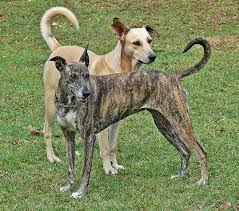
Africanis
Conditions of detention
Africanis dogs thrive in rural and suburban environments where they have plenty of space to roam and exercise.
Useful Fact: They can adapt to urban settings if provided with regular exercise and mental stimulation.
Nutrition and diet
A balanced diet of high-quality dog food appropriate for their age, size, and activity level is essential. They can also benefit from a mix of commercial and natural foods.
Useful Fact: Ensure they have access to clean, fresh water at all times, especially in hot climates.
Health
Africanis dogs are generally healthy due to their natural evolution and genetic diversity. However, regular veterinary check-ups are important.
Useful Fact: They are less prone to genetic disorders compared to purebred dogs due to their diverse gene pool.
Grooming and care
The Africanis has a short coat that requires minimal grooming. Weekly brushing is usually sufficient to keep their coat healthy.
Useful Fact: Regularly check for ticks and fleas, especially if they spend a lot of time outdoors.
Education and training
They are intelligent and responsive, making them relatively easy to train. Positive reinforcement methods work best.
Useful Fact: Early socialization and training are crucial to ensure they develop into well-mannered adults.
Toys and entertainment
Africanis dogs enjoy interactive toys, puzzle games, and activities that challenge their minds and keep them physically active.
Useful Fact: They have strong hunting instincts, so games that simulate hunting can be particularly engaging for them.
Safety
Provide a secure, fenced yard to prevent them from wandering off. Their strong prey drive requires vigilant supervision.
Useful Fact: Ensure they are microchipped and have a collar with ID tags for quick identification if they get lost.
Accessories
Essential accessories include a comfortable bed, a sturdy leash and harness, food and water bowls, and grooming tools.
Useful Fact: Invest in durable toys that can withstand their active play and strong jaws.
Socialization
Early and continuous socialization with different people, pets, and environments is crucial for developing a well-rounded dog.
Useful Fact: Exposing them to various environments early on helps prevent fearfulness and aggression.
Travel and Transportation
They generally travel well but should be secured in a crate or with a dog seat belt for safety during car rides.
Useful Fact: Frequent breaks during long trips help them stretch and relieve themselves, making travel more comfortable.
Behavior and psychology
Africanis dogs are known for their loyalty, intelligence, and independence. They thrive on human interaction and can become anxious if neglected.
Useful Fact: Consistent routines and positive reinforcement help them feel secure and well-behaved.
Legal aspects
Ensure your pet is registered and compliant with local laws regarding vaccinations and licensing.
Useful Fact: Microchipping your dog provides a permanent ID, increasing the chances of being reunited if lost.


